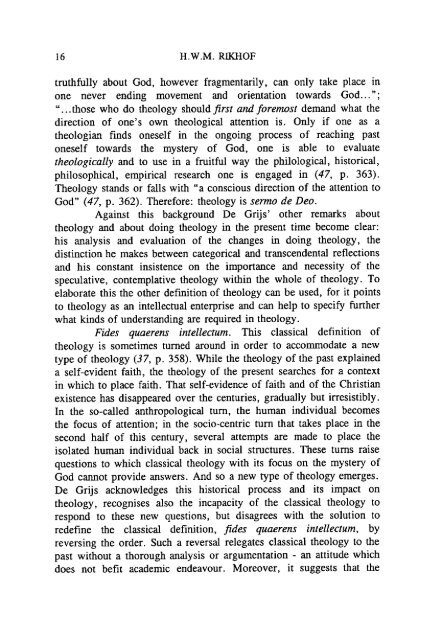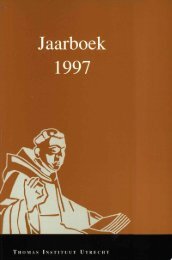Jaarboek Thomas Instituut 1995 - Thomas Instituut te Utrecht
Jaarboek Thomas Instituut 1995 - Thomas Instituut te Utrecht
Jaarboek Thomas Instituut 1995 - Thomas Instituut te Utrecht
You also want an ePaper? Increase the reach of your titles
YUMPU automatically turns print PDFs into web optimized ePapers that Google loves.
16 H.W.M. RIKHOF<br />
truthfully about God, however fragmentarily, can only take place in<br />
one never ending movement and orientation towards God... ";<br />
" ... those who do theology should first and foremost demand what the<br />
direction of one's own theological at<strong>te</strong>ntion is. Only if one as a<br />
theologian finds oneself in the ongoing process of reaching past<br />
oneself towards the mys<strong>te</strong>ry of God, one is able to evalua<strong>te</strong><br />
theologically and to use in a fruitful way the philological, historical,<br />
philosophical, empirical research one is engaged in (47, p. 363).<br />
Theology stands or falls with "a conscious direction of the at<strong>te</strong>ntion to<br />
God" (47, p. 362). Therefore: theology is sermo de Deo.<br />
Against this background De Grijs' other remarks about<br />
theology and about doing theology in the present time become clear:<br />
his analysis and evaluation of the changes in doing theology, the<br />
distinction he makes between ca<strong>te</strong>gorical and transcendental reflections<br />
and his constant insis<strong>te</strong>nce on the importance and necessity of the<br />
speculative, con<strong>te</strong>mplative theology within the whole of theology. To<br />
elabora<strong>te</strong> this the other definition of theology can be used, for it points<br />
to theology as an in<strong>te</strong>llectual en<strong>te</strong>rprise and can help to specify further<br />
what kinds of understanding are required in theology.<br />
Fides quaerens in<strong>te</strong>llectum. This classical definition of<br />
theology is sometimes turned around in order to accommoda<strong>te</strong> a new<br />
type of theology (37, p. 358). While the theology of the past explained<br />
a self-evident faith, the theology of the present searches for a con<strong>te</strong>xt<br />
in which to place faith. That self-evidence of faith and of the Christian<br />
exis<strong>te</strong>nce has disappeared over the centuries, gradually but irresistibly.<br />
In the so-called anthropological tum, the human individual becomes<br />
the focus of at<strong>te</strong>ntion; in the socio-centric tum that takes place in the<br />
second half of this century, several at<strong>te</strong>mpts are made to place the<br />
isola<strong>te</strong>d human individual back in social structures. These turns raise<br />
questions to which classical theology with its focus on the mys<strong>te</strong>ry of<br />
God cannot provide answers. And so a new type of theology emerges.<br />
De Grijs acknowledges this historical process and its impact on<br />
theology, recognises also the incapacity of the classical theology to<br />
respond to these new questions, but disagrees with the solution to<br />
redefine the classical definition, fides quaerens in<strong>te</strong>llectum, by<br />
reversing the order. Such a reversal relega<strong>te</strong>s classical theology to the<br />
past without a thorough analysis or argumentation - an attitude which<br />
does not befit academic endeavour. Moreover, it suggests that the








